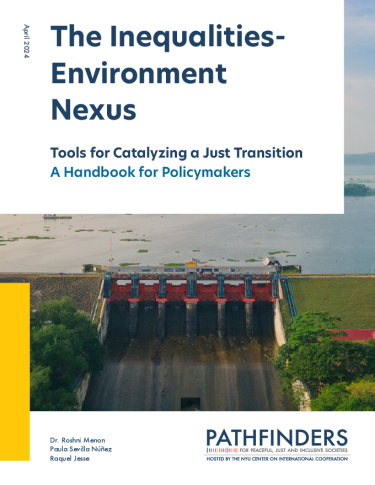Transitioning to a green economy is imperative for all countries, and many have already started their journeys. The process of planning and executing a transition presents a once-in-a-lifetime opportunity to ensure the movement toward an environmentally sustainable and climate-safe future that benefits society as a whole and occurs in a just and equitable manner.
A transition towards a greener economy is fundamentally also a matter of justice: it can save lives and improve livelihoods, as well as address historic injustices. Importantly, a just green transition can address people’s fears and uncertainties about potential negative effects on economies, livelihoods, and the environment, thus preventing backlash to the coming change and instead, widening political support.
As part of collaborative effort between the Pathfinders for Peaceful, Just and Inclusive Societies hosted at the Center on International Cooperation (CIC) at New York University (NYU), the International Climate Initiative for a Just Energy Transition (IKI JET) by the German Agency of International Cooperation (GIZ), and the Ministry of Development Planning of the Republic of Indonesia (BAPPENAS), this report was developed in preparation for a workshop on just green transition administered in Bogor, Indonesia on November 2–3, 2023.
This resource covers the following topics:
- Conceptual definition, sector affected, opportunities, and challenges for just transition.
- Fundamental pillars in catalyzing a just transition, including distributional impact assessments (DIA), an intersectionality-based policy analysis (IBPA) framework, and social dialogue.
Download the handbook: Tools for Catalyzing a Just Transition: A Handbook for Policymakers
This handbook is also accompanied by additional worksheets tailored to apply these concepts within the country context of Indonesia for the workshop. For access to these worksheets, please contact the authors directly.
